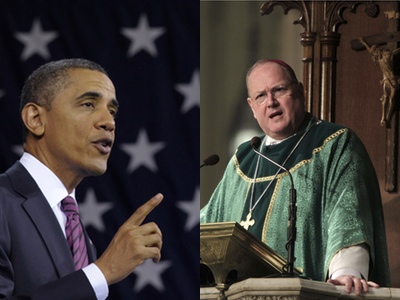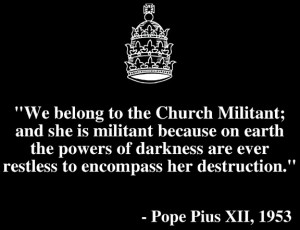When you have a post with a title with two acronyms, a healthcare law, a bureaucratic mandate, the USCCB, and the Social Doctrine of the Church, you have to be prepared for one thing, and one thing only: not pleasing everyone.
That’s why this is an interesting time to live, see? And it’s Holy Week too? Stepping back into time with the treasure map I shared yesterday, today marks the day Our Savior cursed a fig tree, cleansed the temple, cured many who were ill, and taught a lesson on faith that can move mountains. These acts got the rapt attention of the folks who were in authority, and they were none to happy about them either. Talk about stirring up a hornets nest. Sheesh!
But that was then, and this is now, right? Fast forward back to 2012 and today we had the President of the United States answering a reporters question wherein he basically says “I hope the Supreme Court (SCOTUS) doesn’t do something crazy and overturn the Affordable Healthcare Act.” In the press conference he even alludes to the unelected group of justices, as if the fact that they are unelected is scary, or something.
Don’t forget the human element. And the opinions of a whole lot of other folks. Actually, to me anyway, the President doesn’t sound very confident. In fact, he sounded about as convincing as Solicitor General Donald B. Verrilli, Jr. did when he tried to argue to the Supreme Court the merits of governments case for the Affordable Care Act. Which is to say he doesn’t sound very convincing at all.
Allah Pundit’s take on this mirrors mine, so I’ll share a taste of his commentary here,
The “strong majority” in Congress went 219-212 in the House, with 34 Democrats defecting. Not a single Republican in either chamber voted for it, and as Ace notes, the public itself has been steadfastly opposed to the law since day one. Against that backdrop, it’s an amazing show of balls by The One to dress this up as the Court somehow thwarting the people’s will. But even if O-Care really did have a “strong majority,” so what? The whole point of judicial review is to make sure that congressional majorities, strong or not, remain bound by their enumerated powers and the Bill of Rights. You know what law really did have a “strong majority” in both chambers? DOMA. Think there’ll be any tears shed on the left for majoritarianism if Anthony Kennedy cashiers that one on a 5-4 vote?
Incidentally, almost a year ago to the day, the Washington Post published an opinion about the Supreme Court that you may want to read again, just in case you were starting to fall for the Presidents line. The title alone speaks volumes: Supreme Court Justices aren’t political hacks in robes, not that they’re perfect or anything.
An analysis by Supreme Court advocate Thomas Goldstein on SCOTUSblog also chips away at the notion that justices rule in lockstep with their political preferences and are constantly at each other’s throats. In the 2010 essay “Everything you read about the Supreme Court is wrong,” Mr. Goldstein notes that 5-to-4 splits were rendered in less than 20 percent of the cases during the court’s 2009 term — the most recent term for which full statistics are available. During the ’09 term, “roughly half the decisions were nine to zero.”
Justices are not devoid of points of view, and their “judicial philosophies” help steer them to certain results. There will be cases in which the justices appear to split along ideological lines, and the Wal-Mart case may very well be one of them. Debate and disagreement over the merits of a decision are understandable; not so painting justices as mere political hacks camouflaged in judicial robes.
Which brings me to the bishops and Catholic social teaching, where everyone will be as happy as when the cursed fig tree withered and died. And during an election year too, where denizens of Extremistan aren’t just restless, but on the march? You see, the truth is that political partisans are irritated by the fact that the Catholic Church works within all systems of government wherever she happens to be. And she will carry out her mission regardless of who is in power, or how they came into office. Monarchy? The Church is fine with that. Democratically elected governments? She’s fine with that too. Dictatorships? Not so fine with it, but she will persevere, despite persecution.
No one person can fully explain how the Church interacts with, and within, any form of government. But for a pretty good primer, you could do worse than read James Baresel’s HHS Mandate: Morality and the Common Good. If anything, his essay will help you understand why the Church can, on the one hand, support “government provided healthcare for all,” while on the other hand, cry foul when a government overreaches, and threatens the common good. But first, a history lesson. Have a look,
In the 14th century William of Ockham proposed a theory which constituted a complete reversal of the Catholic understanding of morality. According to Catholic theology and philosophy good and evil are determined by God’s nature, not by God’s free will. God can command us which goods to choose (for example he could command marriage or celibacy) and some of these goods are mutually exclusive. But it is not God’s willing and commanding us to choose something which makes that thing good. It is God’s nature which first determines what is good and then it is God’s will which chooses, or commands us to choose, among those things which God’s nature has determined to be good. Because of this there are some things which God must command and some things which God cannot command—though both necessities are determined by God’s nature. An example would be that God must command us to love him and cannot command us to hate him since the goodness of the love of God and the evil of hatred of God are absolutely determined by God’s nature. According to this theory truth and goodness (the truth and goodness of God’s nature) are more fundamental than freedom of will.
Ockham reversed this. According to Ockham God’s nature does not determine what is good and evil. Good and evil are, for Ockham, merely choices made by God’s will. God could command the exact reverse of everything which he has commanded. So, for Ockham, God could command us to hate him (God). Put in different terms, Catholic theology and philosophy considers the basis of law to be nature, Ockham considers the basis of law to be free will. Catholic theology and philosophy is, more broadly, a theory of the good while the positions of Ockham, more broadly, are a theory of freedom.
This has important implications for government. For those adhering to Catholic thought, for the government to have the authority to control a certain aspect of human life (health care) is specifically the authority to control that aspect of human life on the basis and for the purpose of what God and the natural law, which can be known by human reason (but which was created by God), tell us is good. It is not an authority for the government to control that aspect of life however it wants, commanding whatever it wants. Those who follow the tradition of Ockham claim that if the government has the authority to control a certain aspect of human life (health care) then the government has the authority to command whatever it wills in that regard. The voluntarist, therefore, holds that either the government must be denied the authority to control a certain aspect of life (health care) or else the government must be allowed to control that aspect of life in whatever way it (the government) wants.
The Catholic sees no such dichotomy. Since the Catholic holds that the authority of the government is specifically authority to do good, the Catholic holds that the government should have the ability to control certain aspects of life (such as health care) for the good, but not for evil. For the Catholic the important question is not the question of whether the government is controlling something but how the government is controlling something. For the voluntarist the question is not how the government is controlling but whether the government is controlling. The Catholic asks whether the government is controlling for good or for evil. The voluntarist asks whether the government is controlling or not. The thinking of the voluntarist is, in fact, morally obtuse. By not asking the question of whether the government is controlling for good or for evil and by asking only whether or not the government is controlling, the voluntarist draws a moral equivalent between good and evil.
Read the rest over at The Distributist Review, or Catholic Lane. Just prepare yourself for a more nuanced view than “all government run healthcare leads to tyranny and death panels” or “the bishops should stick to their areas of expertise only,” like this post over at Crisis Magazine tries to argue, and you’ll probably do just fine.
That the Church will always have a tough row to hoe whenever she interacts with the state, both now and until the end of time, should come as no surprise to anyone. The tip of the iceberg is right there in the Compendium of the Social Doctrine of the Church. Such are the trials and tribulations of the city on a hill, which the Body of Christ is called to be.
After all, it is Holy Week. Time to pick up our crosses and follow the Lord. He never promised us a rose garden.
*Image Credit: weaselzippers.us













